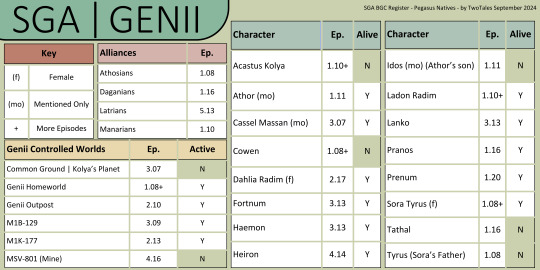#Acastus
Explore tagged Tumblr posts
Text
Introducing the Acastus Knight Porphyrion.
#miniatureart#coolminis#primaris#best4minis#warhammer#warhammerkitbash#grimdark#warhammer40k#Acastus#miniaturespainting#warhammerconversion#gamesworkshop
20 notes
·
View notes
Text
So I was doing research into Acastus (only son of Pelias and brother of Alcestis) because he's relevant in the next part of the God of the Golden Bow, and while I was looking through refs to him in ToposText, I found this one:

When his daughters killed Pelias, his son Acastus chased after them, intending to kill them in return for their father. The other sisters he was able to catch, but Alcestis escaped to Pherae where her cousin Admetus lived. Since she sat down at his hearth (as a supplicant), Admetus was unable to give her back to Acastus when he demanded her. The latter besieged the city with a large army and began to ravage them with fire. Admetus made a sortie [a raid or charge from a defensive position] during the night but happened on an ambush and was captured alive. Acastus threatened to kill him, if he refused to hand over Alcestis, even though she was a supplicant. But Alcestis, when she found out that Admetus was about to lose his life because of her, came out and gave herself up to Acastus, who thereupon released Admetus and took Alcestis into custody. People therefore said: "Brave/manly Alcestis, who voluntarily died on behalf of Admetus."
This is from a work rationalising the Greek myths, date and author unknown b/c 'Palaephatus' is thought to be a pseudonym, but according to wikipedia it's estimated to be from 4th century BC Athens. People have been looking for logical explanations for myths for a long time. And even though it takes out most of the fun stuff with the gods... I kinda love it?
In this version, Admetus and Alcestis aren't even married (yet?), and yet they still make sacrifices for each other. Admetus still protects Alcestis from her brother. Alcestis still offers her life to save Admetus. Heracles doesn't pick a fight with Thanatos, but he does fight an entire army on behalf of Admetus, and is able to save Alcestis.
I wasn't actually going to retell that part of the myth, since the timeline would be screwy with the Argonautica... but since the point of the series as I envisioned it was 'how the myths are born and how they change through the centuries'... maybe this will fit in?
#greek mythology#the god of the golden bow (fic)#admetus#alcestis#acastus#admetus/jason/acastus are an underrated family drama#'heracles got annoyed' lol
3 notes
·
View notes
Text

Mitul lui Acastus
În mitologia grecească, Acastus a fost un rege care a navigat împreună cu argonauții în căutarea vestitei Lâni de Aur. Iason, tovarășul său argonaut, a adus o vrăjitoare numită Medeea în regatul tatălui lui Acastus, Iolcus . https://www.diane.ro/2024/06/mitul-lui-acastus.html
1 note
·
View note
Text
i want to see more EVAs in 40k. like 'space' is on the name of space marines, have them fighting it out with the tau on the hull of a starship, or skitarii pinned down by traitor marines as the prevent a boarding action, or a group of votann kin being repelled by an imperial knight that has magnatised itself to the hull
77 notes
·
View notes
Text

Acastus Knight by Games Workshop
#Warhammer#40k#Imperium#Imperium of Man#Adeptus Mechanicus#Imperial Knights#Questor Imperialis#Acastus Knight#Sci-Fi#Mecha#Games Workshop
45 notes
·
View notes
Text




Stargate Atlantis "Remnants"
#Stargate Atlantis#SGA#Remnants#Acastus Kolya#fake!Kolya#John Sheppard#stargateedit#sgaedit#syfysource#tvedit#scifiedit#GIF#my gifs#it's not a stargate rewatch rewatch#Hide and Queue
218 notes
·
View notes
Text
Kolya...
#stargate atlantis#rodney mckay#Kolya acastus#SGA#reel#fanart#sga rodney#stargate#sga kolya#digitalart#digitalartist#2dart#digitaldrawing#stargateatlantis#acastus kolya#sga fanart
28 notes
·
View notes
Text
Without saying another word, Kolya took the baton from the guard and struck it down, a sharp crack of bone snapping out in unison with Rodney's scream of pain.
"And I will break you."
#ITS FUCKING HERE YALL#MY RODNEY WHUMP FIC#THAT TURNED INTO A MCSHEP WHUMP FIC#AND TOOK ALMOST#TWO. YEARS#TO FINISH#BUT ITS FUCKING HERE#HELL YEAH#i hope y'all enjoy#bc this fic makes me fucking feral#mcshep#john sheppard#rodney mckay#acastus kolya#elizabeth weir#carson beckett#evan lorne#ronon dex#teyla emmagan#nurse marie#my writing#fanfic#sga fanfic#sga#stargate atlantis
13 notes
·
View notes
Text





"I have no intention of letting you die. Now climb back up, John."
77 notes
·
View notes
Note
Acastus Kolya from Stargate Atlantis

18 notes
·
View notes
Text

SGA Background Character Register
Pegasus Natives | Genii
-
Decided to start a Pegasus Native register
I'm debating on adding a sheet that describes these characters' attributes so they can be easily added to any fic
-
Notes:
- Only Genii with names - Canonically female characters are marked because there are less of them - Alive: Meaning we never saw them die or been informed of their death
Feel free to use this as you see fit just please keep my user name on the image
-
Sga Background Character Register | Atlantis Expedition S1
#not too sure about the colors - I feel like it gives off genii vibes but idk 🤷♂️ im not paid for this 😂 so whatever#just been thinking about the genii and got inspired because I did not know there were this many who had names in the show lol#tried a new font apparently this is a good one for dyslexia - works good for me so far so I'm hoping it does for others#sga#stargate atlantis#genii#twotalessgastats#twotalessgadata#pegasus natives#side character love#sga background character register#acastus kolya#dahlia radim#cowen#sora tyrus#ladon radim#tyrus#toran#haemon#cassel massan#athor#idos#fortnum#heiron#lanko#pranos#prenum#tathal
12 notes
·
View notes
Text
bodies in my closet - Chapter 1: The Choice
Instead of shooting to kill when faced with Kolya in 3x13 Irresponsible, Sheppard merely wounds him, and is then faced with the moral dilemma of what exactly to do with him. The answer, of course, involves Todd...
Words: 2432, Chapters: 1/?, Language: English
Fandom: Stargate Atlantis
Rating: Mature
Archive Warning: Graphic Depictions Of Violence
Category: M/M
Relationship: John Sheppard/Todd the Wraith
Characters: John Sheppard Todd the Wraith (Stargate) Acastus Kolya
Additional Tags: Sheppard POV Torture Wraith Feeding (Stargate Atlantis) Dead Dove: Do Not Eat Wraith Culture (Stargate) Sentient Atlantis (Stargate) Sheppard goes darkside! 3x13 Irresponsible
Tagging everyone who's expressed interest in this (I think I got you all haha) I won't tag you for future chapters unless you ask so I'm not spamming you! @adriankyte-writes @frostysfrenzy @bagheerita @annwayne @sga-owns-my-soul
@anonmadsci @wyked-ao3 @chaniis-atlantis
#mine#fanfic#archive of our own#ao3#my fic#writeblr#john sheppard#todd the wraith#kolya#acastus kolya#stargate#stargate atlantis#sga
10 notes
·
View notes
Link
Chapters: 7/7 Fandom: Stargate Atlantis Rating: Explicit Warnings: Rape/Non-Con Relationships: Rodney McKay/John Sheppard Characters: Rodney McKay, John Sheppard, Acastus Kolya Additional Tags: Rape, Hurt/Comfort, Sexual Violence, First Kiss, McShep - Freeform Summary:
Set at the time of Common Ground (S3:E7) if Kolya did not have a pet wraith or an army. Basically, he has nothing left but rage and the desire to take revenge on John Sheppard.
#mchsep#stargate atlantis#john sheppard#rodney mckay#acastus kolya#non-con fic#completed fic#hoodedandcloaked writes
8 notes
·
View notes
Text
Behold the mighty Acastus Knight Porphyrion ready to enact the judgement of the Omnissiah!

#Deus Mortis Gloriam Imperator#warhammer 40k#40k#wh40k#mini painting#acastus knight porphyrion#imperial knight#freeblade knight#terrain#cinematic
74 notes
·
View notes
Text

12 notes
·
View notes
Text





Stargate Atlantis "Remnants"
#Stargate Atlantis#SGA#Remnants#John Sheppard#Acastus Kolya#fake!Kolya#sgaedit#stargateedit#syfysource#GIF#my gifs#it's not a stargate rewatch rewatch#Hide and Queue
182 notes
·
View notes